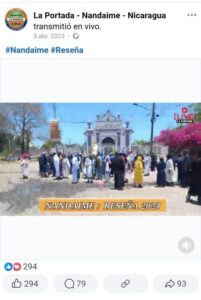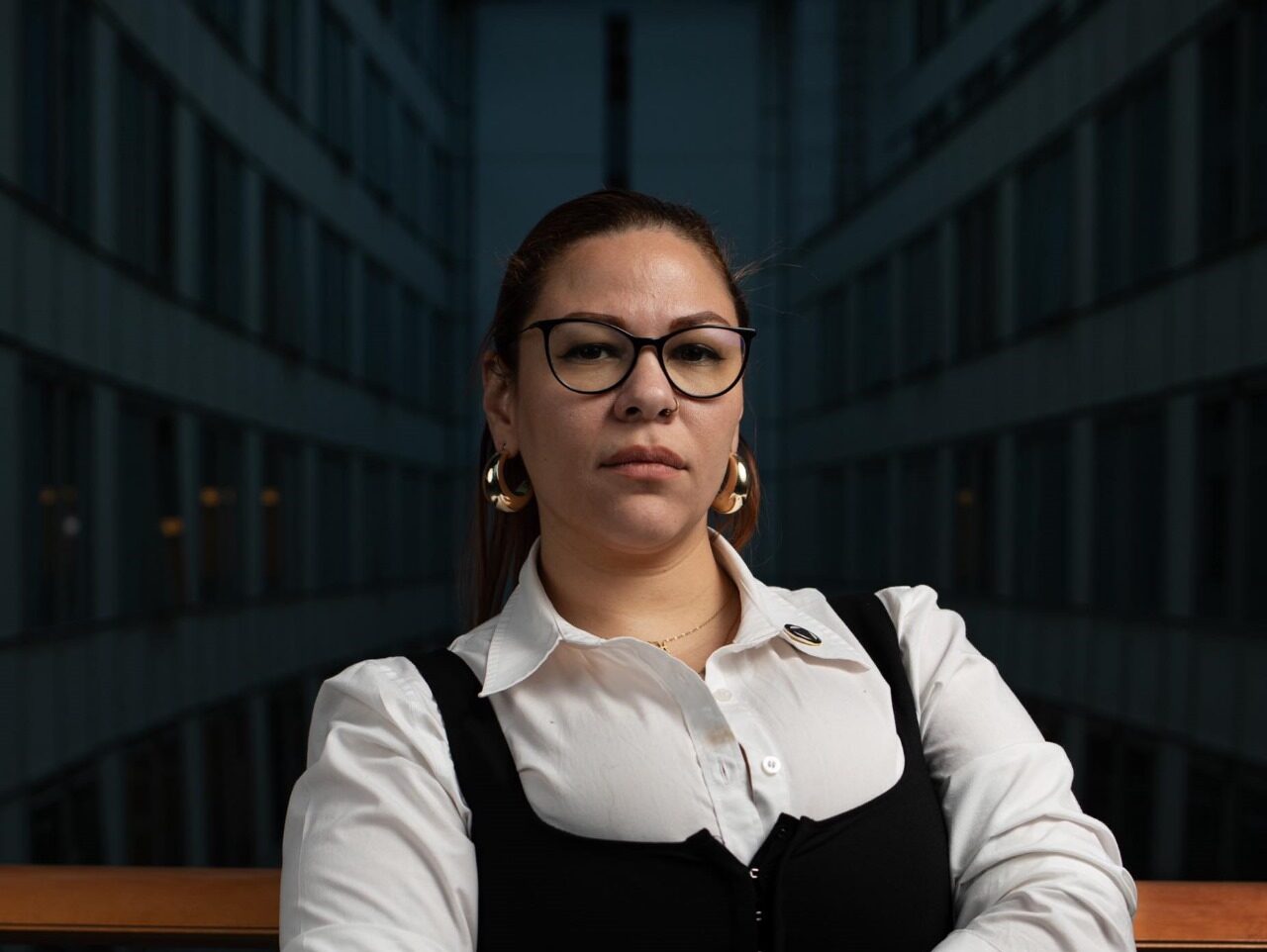The live broadcast of a Holy Week procession on a Facebook account was the reason why Nicaraguan journalist Victor Ticay spent 517 days in prison.
In August last year, Ticay was sentenced to eight years in prison after being accused of conspiring to destabilize national integrity and spreading false information. The latter charge was based on the Special Cybercrime Law, number 1042, passed on Oct. 27, 2020, by the Nicaraguan parliament.
“I had some friction with the government since covering the 2018 protests and for not following their media policies,” Ticay told LatAm Journalism Review (LJR). “The day after I posted the video of the religious procession, security agents came to my house, stole some of my belongings, and abducted me.”

The live broadcast of a Holy Week procession on a Facebook account was the reason why Nicaraguan journalist Victor Ticay spent 517 days in prison (Photo: screenshot - Facebook broadcast).
This Sept. 5, while the former director of the Facebook page "La Portada" and correspondent for Canal 10 was serving his sentence in La Modelo, a maximum-security prison outside of Managua, he was released and exiled to Guatemala.
His release came along 134 other individuals as part of a negotiation between President Daniel Ortega's regime and the United States government.
But exile does not mean freedom. Just four days later, the Nicaraguan parliament approved the Reform Initiative and Additions to the Special Cybercrime Law, which “will not only serve as a censorship mechanism within Nicaragua but also aims to persecute those practicing independent journalism and advocacy outside the country,” as political activist, human rights defender and member of the Nicaraguan Assembly for Democracy, Alexa Zamora told LJR.
In Nicaragua, practicing independent journalism results in being discredited, persecuted, criminalized and exiled. From 2018 to 2024, at least 54 media outlets have been shut down, and around 275 journalists have been forced into exile, according to data from the Foundation for Freedom of Expression and Democracy (FLED, for its acronym in Spanish). At least 25 journalists have been stripped of their nationality.
“There are no independent media outlets operating in Nicaragua due to the high level of persecution and criminalization,” Zamora said. “This reform is meant to stop journalistic work in exile by intimidating those who continue to inform.”
According to the approved document, the Cybercrime Law reform stipulates that anyone using information technologies, social networks, or mobile applications to publish or spread false information or cause panic among the population will face a prison sentence of three to five years and a fine of three hundred to five hundred days' wages.
The categorization of what is false information or not, both in the original law and in the reform, is carried out at the discretion of the government of Nicaragua. Nicaraguan media documented the case of a farmer who was convicted in 2022 under the previous version of the cybercrime law despite not knowing how to use a cell phone or computers.
“It is the dictatorship that is the great manufacturer of false news in Nicaragua, not society or its critics as they want to make it out to be,” independent Nicaraguan journalist in exile, Octavio Enríquez, told LJR.
Zamora explained that even if the accused is in exile, the government may bring them to trial in absentia. The consequences of a trial in absentia can be monitoring, harassment of family members, denationalization processes, and confiscation of assets within the country.

On Sept. 5, journalist Victor Ticay was released and exiled to Guatemala (Photo: courtesy).
“The dictatorship hasn’t been able to stop the information coming from exile. With this reform, they seek to intimidate because not all of us can get our entire families out,” Ticay said.
Enríquez agrees. For him, the cybercrime law is another tool of the “terror that the Nicaraguan regime has adopted as state policy.”
Enríquez left Nicaragua in 2021 after being summoned for a second time by the public prosecutor’s office in connection with the case against the Violeta Barrios de Chamorro Foundation, an organization dedicated to promoting independent journalism and press freedom in Nicaragua. The former director of this foundation was sentenced by Nicaraguan courts to eight years in prison for money laundering and misappropriation.
Although Enríquez wasn’t threatened with being charged with the Cybercrime Law, other journalists involved in that case were. One such journalist was Wilfredo Miranda, co-founder of the media outlet Divergentes.
In an interview with the media outlet Confidencial, Miranda said that during his 2021 interview with Prosecutor Heidy Ramírez, he was questioned and accused of violating the Special Cybercrime Law.
“She started asking about my relationship with the Violeta [Barrios de Chamorro] Foundation, and I talked about the awards, some specific consulting work I did... but I was surprised when she took a break, came back with her cell phone, and started reading all my articles. She began to incriminate me, saying I was lying, that I was breaking the Cybercrime Law,” Miranda told Confidencial.
Miranda is now also in exile.
In August, UN member states approved the first legally binding treaty on cybercrime after three years of negotiations. This document seeks to offer tools that will improve international cooperation on cybercrime.

"The Special Cybercrime Law aims to persecute those practicing independent journalism and advocacy outside the country,” said human rights defender Alexa Zamora. (Photo: Courtesy)
However, organizations and experts have found gaps and contradictions within the treaty that can be used to validate abuses against freedom of expression.
“This convention gives states the power to monitor and potentially spy on individuals of interest in real-time,” said Zamora. “This is quite concerning because we have already seen how dictatorships misuse international control mechanisms.”
Despite this, Nicaraguan journalists in exile say they remain committed to journalism. “They are reporting from abroad under difficult conditions, with low pay, and in some cases, without insurance. And despite everything, they continue,” Enríquez said.
Ticay, during his detention, was stripped of his property and at the time of his exile he was only given a passport with a photo of him wearing a prisoner's uniform. Despite this, he has not yet considered leaving journalism and hopes to move to the United States in the future.
“I want to keep doing journalism,” Ticay said. “It’s what I studied, and what I’ve worked on—bringing attention to the needs of people in the communities. My commitment will continue to be to the truth.”